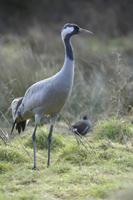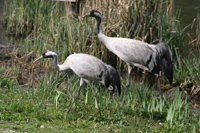Extinct bird set to return to West Country - £700,000 project comes to rescue of rare cranes
Somerset Wildlife charities hope to increase the number of cranes in Britain with a £700,000 breeding programme.


Eggs imported from Germany will be incubated, hatched and hand-reared at Slimbridge, Gloucestershire. The birds will then be released into the wild on the Somerset Levels, where there is a suitable habitat for them to nest and feed. The programme is expected to start this summer and be complete by spring 2010.
The Great Crane Project said that since 1981 the crane had struggled to survive in Britain. The project – a partnership between the Wildfowl & Wetlands Trust, the RSPB and Pensthorpe Conservation Trust – intends to secure the future of the crane as a British breeding bird.
Mark Avery, the RSPB’s director of conservation, said: “The crane is one of our most spectacular birds, and its widespread disappearance from our countryside creates a large vacuum. We hope that, in time, the bugling call of the crane will once again echo across large swaths of the UK countryside.”
Debbie Pain, of the Wildfowl & Wetlands Trust, said: “We’re determined to give them another chance.”
Visit the website for full story WWT


Eggs imported from Germany will be incubated, hatched and hand-reared at Slimbridge, Gloucestershire. The birds will then be released into the wild on the Somerset Levels, where there is a suitable habitat for them to nest and feed. The programme is expected to start this summer and be complete by spring 2010.
The Great Crane Project said that since 1981 the crane had struggled to survive in Britain. The project – a partnership between the Wildfowl & Wetlands Trust, the RSPB and Pensthorpe Conservation Trust – intends to secure the future of the crane as a British breeding bird.
Mark Avery, the RSPB’s director of conservation, said: “The crane is one of our most spectacular birds, and its widespread disappearance from our countryside creates a large vacuum. We hope that, in time, the bugling call of the crane will once again echo across large swaths of the UK countryside.”
Debbie Pain, of the Wildfowl & Wetlands Trust, said: “We’re determined to give them another chance.”
Visit the website for full story WWT